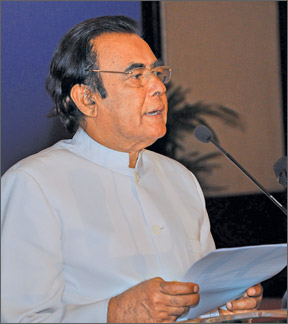|
Sri Lanka’s social protection policies:
Contributes to reducing rich, poor gap
[Benefits for people]
* School midday meals
* Free school uniforms, textbooks
* Free medical facilities
* Samurdhi benefits over 1.5 m families
* Poverty rate declines from 15.2 percent in 2006 to 7.6 percent in
2010
* Govt pension scheme benefits nearly million workers
* EPF, ETF benefits nearly two million workers
* Numerous social protection laws enacted
Text of the speech by Prime Minister D M
Jayaratne at the third meeting of the UNESCO Forum of Ministers in
Charge of Social Development Forum from South Asia from February 20-22,
2011 in Colombo
The focus of the forum will be on ‘social protection policies in
South Asian countries’, a very relevant theme that will afford the
participating countries to discuss at length the social protection
policies implemented in their respective countries.
|

Prime Minister D M Jayaratne addressing the third meeting of the UNESCO
Forum of Ministers in Charge of Social Development Forum.
Picture by Susantha Wijegunasekera |
There will be healthy exchange of ideas, perspectives, views and
country experiences in the formulation and implementation of social
protection policies by each of the member countries, that will come in
good stead in making realistic assessments and evaluations of their
individual policies. Such self-assessments and evaluations would help
reformulating or reshaping their individual country policies to provide
greater benefits to their citizens.
Social protection is described as a set of public measures that a
society provides for its members to protect them against economic and
social distress caused by the absence or substantial reduction of income
from work as a result of various contingencies such as sickness,
maternity, employment injury, unemployment, old age, etc.
Social protection policies
Some developed countries with their vast resources and wealth had
succeeded in introducing over the years social protection measures that
had secured far-reaching benefits to their citizens. The developing
countries too have taken social protection initiatives, though not as
advanced as in the developed world, in conformity with the level of
their economies that had benefitted their citizens for considerable
length of time.
I consider it appropriate at this point, to present in brief for your
information Sri Lanka’s experience in the formulation and implementation
of social protection policies over the years some of which have targeted
the whole country contributing thereby to narrowing the gap between the
rich and the poor in Sri Lanka.
Introduction of free education for the whole country from the primary
school level to the university education for the last 60 years had not
only produced a highly literate society but also opened up vast
potential and avenues for the educated rural poor to rise up in the
social ladder.
Healthy society
The free midday meals to the schoolchildren, provision of free
uniforms and textbooks to school going children of all grades further
assisted the economically vulnerable families to educate their children.
The free medical facilities for all the citizens in the country had
helped building a healthy society and the span of life of the people.
The Samurdhi scheme, a package of financial benefits granted together
with employment facilities to those below official poverty line had
benefitted over 1.5 million families in the country to sustain their
livelihood.
All these beneficial measures have contributed to the decline of Sri
Lanka’s poverty which was 15.2 percent in 2006 to 7.6 percent in 2010. I
can add a plethora of laws and enactments passed in Sri Lanka’s
legislature that had contributed to social protection of the general
citizens and those employed in the public and private sectors.
Following are principle enactments among many that had been
implemented for considerable number of years providing social protection
to various segments of Sri Lankan society. They are,
* The Government Servants Pension Scheme benefitting nearly a million
of public servants,
* Employees provident Fund and Employees Trust Fund, the two funds
granting financial benefits to nearly two million private sector
employees,
* The following acts too are important,
i. Allowances to Plantation Workers Act
ii. Wages Board Ordinance of 1953
iii. Medical Wants Ordinance
iv. Industrial Disputes Act
v. Payment of Gratuity Act
vi. Maternity Benefits Ordinance
Implementation of above acts and ordinances among many other Acts had
provided considerable social protection to Sri Lankan work force.
I am aware that our sister countries of South Asia too have
introduced similar social protection legislations and policy initiatives
to provide social security benefits to their citizens. However, we can
expect in this Forum frank discussions and exchange of views quite
candidly among the participants with regard to their experiences and
practices in the social protection field. The outcome of the
deliberations as expected by UNESCO would contribute to -
* advancement of the agenda for a social protection floor in South
Asia and
* advancement of knowledge and social research on neglected themes
and excluded groups in the field of social protection
I have noted that in addition to the Ministers and their delegation
there are about 15 - 20 scholars, experts specialized in the area of
social protection who have been invited for this Forum. Their
interactions and intellectual contributions would further enhance the
value of the deliberations at this meeting.
UNESCO deserves our sincere thanks for the pioneering efforts taken
to work in collaboration with member countries of South Asia to promote
and enhance dialogue between Ministries, academic researchers and
members of Civil Society for development of social protection policies
of South Asia.
There were two earlier fora organized by UNESCO; the first was held
in Pakistan in 2006 on the theme ‘Public Accountability’. The second
forum was held in India in 2008 on ‘Transparency, Right to information
and Social Development’. They were vital topics that had evoked useful
discussion and exchange of views that had benefitted the member
countries. |



